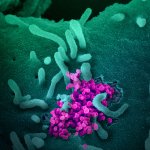Image source: Unsplash/Alonso Reyes
News • Implications for lockdown policies
Cruise ship study hints at many ‘silent’ COVID-19 infections
The prevalence of ‘silent’ symptomless COVID-19 infection may be much higher than thought, reveals a study charting the enforced isolation of cruise ship passengers during the current pandemic.
The researchers published their findings in the journal Thorax.
More than eight out of 10 of passengers and crew who tested positive for the infection had no symptoms. This has implications for the easing of lockdown restrictions, says Professor Alan Smyth, joint editor in chief of the journal, in a linked blog. And the findings emphasise the pressing need for accurate global data on how many people have been infected.
Recommended article

News • Coronavirus duration questioned
COVID-19 symptoms disappear – while the virus itself remains
In a new study, researchers found that half of the patients they treated for mild COVID-19 infection still had coronavirus for up to eight days after symptoms disappeared. The research letter was published online in the American Thoracic Society’s American Journal of Respiratory and Critical Care Medicine.
The researchers, all of whom were on board the vessel, describe events on an expedition cruise ship carrying 128 passengers and 95 crew. The ship departed from Ushuaia, Argentina, for a planned 21 day cruise of the Antarctic, taking a similar route to that of Ernest Shackleton in 1915-17. It set sail in mid-March after the World Health Organization had declared COVID-19 a global pandemic. Passengers who, in the previous three weeks, had passed through countries where COVID-19 infection rates were already high, were not allowed to board. And everyone’s temperature was taken before embarkation. Hand sanitising stations were plentiful aboard ship, particularly in the dining room.
The first case of fever was reported on day 8, prompting the immediate adoption of infection control measures. This included confining passengers to their cabins, stopping daily servicing, apart from the delivery of meals, and the wearing of personal protective equipment for any crew member in contact with sick passengers. As Argentina had closed its borders, the ship sailed to Montevideo, Uruguay, arriving on day 13. Eight passengers and crew eventually required medical evacuation to hospital at this point for respiratory failure.
On day 20 all the remaining 217 passengers and crew were swab tested for coronavirus. More than half (128; 59%) tested positive. In 10 instances, two passengers sharing the same cabin didn’t have the same test result, possibly because the current swab test returns a substantial number of false negative results, say the authors. Of those testing positive, 24 (19%) had symptoms, but 108 (81%) didn’t. The ship had no contact with other people for 28 days after its departure, so was the equivalent of a hermetically sealed environment.
As countries progress out of lockdown, a high proportion of infected, but asymptomatic, individuals may mean that a much higher percentage of the population than expected may have been infected with COVID
Alan Smyth
The study authors conclude that the prevalence of COVID-19 infection on cruise ships is likely to be “significantly underestimated,” prompting them to recommend that passengers should be monitored after disembarkation to ward off potential community spread of the virus. And the potentially high rate of false negative results obtained with the current swab tests suggests that secondary testing is warranted, they add.
In a linked blog, Professor Smyth acknowledges: “It is difficult to find a reliable estimate of the number of COVID positive patients who have no symptoms.” But the figure of 1% suggested by the WHO in early March falls far short of that found on the cruise ship, he points out. “As countries progress out of lockdown, a high proportion of infected, but asymptomatic, individuals may mean that a much higher percentage of the population than expected may have been infected with COVID,” he suggests. But whether or not those who have been infected are immune, the findings emphasise a pressing need for accurate global data on how many people have been infected, he concludes.
Source: The BMJ
28.05.2020





